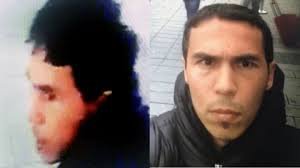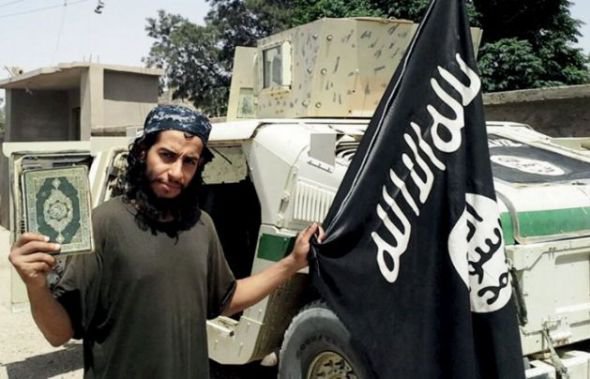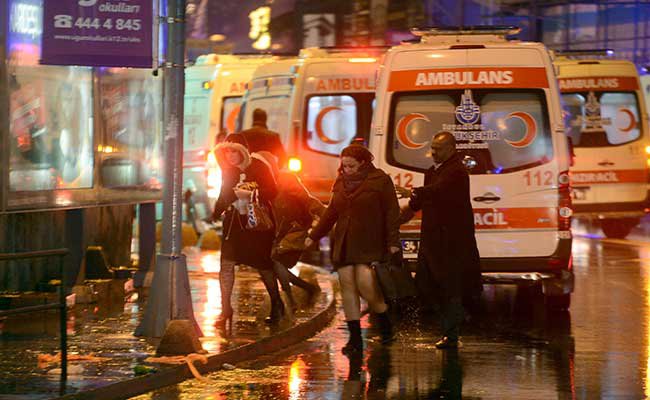The gunman who killed 39 people at an Istanbul nightclub had fought in Syria for Islamic State jihadists, a report said on Tuesday, as Turkish authorities intensified their hunt for the attacker.
Police released pictures of the suspect who went on the rampage at the plush Reina nightclub on New Year’s night, spraying some 120 bullets at terrified guests before slipping away into the night.

Of the 39 dead, 27 were foreigners, mainly from Arab countries, with coffins repatriated overnight to countries including Lebanon and Saudi Arabia.
The Islamic State group on Monday claimed the massacre, the first time it has clearly stated being behind a major attack in Turkey.
The government said Monday that eight people had been detained but media reports said the number had increased to 12 after new detentions in the Anatolian city of Konya.
The Dogan news agency said they included a woman suspected of being his wife but gave no further details.
‘Specially selected’
The Hurriyet daily said the attacker showed signs of being well trained in the use of arms and had fought in Syria for IS jihadists.
Hurriyet’s well-connected columnist Abdulkadir Selvi said the attacker had been identified, with investigators focusing on the idea he was from Central Asia.
Selvi said he had been trained in street fighting in residential areas in Syria and used these techniques in the attack, shooting from the hip rather than as a sniper.

The attacker had been “specially selected” to carry out the shooting, he said. According to Hurriyet, just 28 bullets failed to hit a target.
Deputy Prime Minister Numan Kurtulmus said on Monday that the authorities had obtained fingerprint data about the gunman and expressed hope he would be “speedily” identified.
Selvi wrote that the priority now was to detain the assailant and neutralise the cell that apparently backed him, in order to prevent any new attack.
“This specially trained terrorist has still not been detained and is still wandering dangerously amongst us,” he wrote.

He said that an IS strike was also planned in Ankara on New Year’s night but that it had been prevented after eight IS suspects were arrested in the capital. There were no further details.
‘Taksim selfie video’
Police meanwhile released the first clear images of the attacker, including one taken by security cameras on the night of the attack.
Meanwhile a chilling video of the suspect taken near Taksim Square in central Istanbul was released, showing him recording himself with a selfie stick and smiling faintly into the camera.
It was not made immediately clear how the footage had been obtained.
Media reports have said the gunman may be from the Central Asian states of Kyrgyzstan or Uzbekistan.
In a statement circulated on social media, the jihadist group said one of the “soldiers of the caliphate” had carried out the Reina shooting.
It accused Turkey, a majority-Muslim country, of being a servant of Christians and the attack was in response to Turkey’s military intervention against the jihadists in war-ravaged Syria.
Turkish troops are pressing on with a four-month incursion to oust IS jihadists the border area while Turkey is also spearheading a ceasefire plan with Russia to form a basis for peace talks on Syria.
The shooting took place just 75 minutes into 2017 after a bloody year in Turkey in which hundreds of people were killed in violence blamed on both IS jihadists and Kurdish militants.

After a cabinet meeting in Ankara chaired by President Recep Tayyip Erdogan, the government vowed that the operation in Syria, dubbed Euphrates Shield, would continue with “determination”.
The foreigners who died — most of them from Arab countries and including Muslims — had come to the club to celebrate a special night in style.
They included three Lebanese nationals, two Jordanians and three Iraqis, as well as several Saudis.
The attack evoked memories of the November 2015 carnage in Paris when IS jihadists unleashed a gun and bombing rampage on nightspots in the French capital, killing 130 people including 90 at the Bataclan concert hall.
Feature Image Source: AFP

















